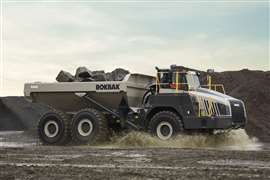ERA welcomes Circular Economy package
08 March 2016
The European Rental Association (ERA) has welcomed the European Commission’s new Circular Economy package, and called for specific recognition for the role of rental in realising a successful European circular economy.
The package, published in December 2015, includes several initiatives towards a Circular Economy and is accompanied by legislative proposals.The objective of a circular economy is to maintain the value of products, materials and resources in the economy for as long as possible, while minimising the generation of waste.
The ERA said the EU was generating some 3 billion tonnes of waste annually - a figure that was increasing at pace. It said estimates from the Organisation for Economic Co-operation suggested that the EU could be generating 45% more waste in 2020 compared to 1990 if no action is taken.
ERA secretary general Michel Petitjean said, “Renting is fundamentally sustainable and sits at the very heart of a successful European Circular Economy – recognition of the environmental and economical advantages that renting brings to business should be an obvious part of any policy making in this area.
“To get to a truly circular model we need to change how people behave and get a cultural buy-in for innovative rental propositions. In particular, public sector procurement of rental is still too low; tendering rules need to allow ‘buying’ equipment as a service, not default to treating it as a capital expenditure.
“Businesses also need an enabling framework of incentives and targets to make the systemic change to rent – and not buy – equipment. More support in this area from the Commission would be especially welcome.”
The ERA has published a five-point manifesto articulating the clear environmental and economical benefits of the rental concept, which can be summarised as:
- Shared usage: construction companies gain access to a wider range of equipment than through ownership, while the equipment itself is intensively used, carefully chosen, well-maintained and on demand - all of which results in a much more efficient usage.
- Reparability: rental companies contribute to product designs facilitating maintenance and repair, and focus on spare parts management.
- Resource use: rental equipment companies search for equipment to offer the most sustainable option to their customers and provide training to optimise its use.
- Reusability: components of dismantled construction equipment can be reused.
- Recyclability: rental companies take care of their equipment by repairing where possible, recycling at the end of the lifecycle, and selling to second-hand markets where this complies with regulations. They also use their bargaining power to encourage equipment suppliers to invest more in R&D to limit the use of non-recyclable material and to take responsibility for end of life equipment.
For these reasons, many businesses already recognise the inherently efficient use of capital represented by the rental concept, evidenced by the steady growth in the European equipment rental industry.
The European equipment rental market in the EU and EFTA countries grew to €23.06 billion in 2014 at constant exchange rates – a growth of 1.9% compared with 2013. For 2015, growth in the European market is estimated at 1.4%, with a forecast of 2.7% for 2016.
The ERA believes the growing impact of the rental market will foster, competitiveness, promote sustainable economic growth and help to generate new jobs – contributing to the Circular Economy aspiration.
Read more about rental and the circular economy in the March issue of International Rental News – available soon.




